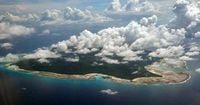Indian police have arrested a 24-year-old U.S. tourist, Mykhailo Viktorovych Polyakov, for illegally entering the highly restricted North Sentinel Island, home to the isolated Sentinelese tribe. The incident, which occurred on March 29, 2025, has raised significant concerns about the safety of both the tourist and the indigenous people, who are known for their hostility towards outsiders.
Polyakov, who arrived in Port Blair on March 26, attempted to make contact with the Sentinelese by bringing offerings of a coconut and a can of Diet Coke. This reckless act comes seven years after another American, missionary John Chau, was killed by the tribe for similar trespassing. The Sentinelese, whose population is estimated to be around 150, are protected under Indian law, which prohibits outsiders from traveling within three miles of the island to prevent exposure to diseases and preserve their way of life.
According to police chief HGS Dhaliwal, Polyakov blew a whistle for about an hour to attract the tribe's attention before landing on the island for a brief five minutes. During this time, he left his offerings, collected sand samples, and recorded video footage before returning to his boat. "A review of his GoPro camera footage showed his entry and landing into the restricted North Sentinel Island," Dhaliwal stated.
Polyakov was arrested two days later, on March 31, after returning to Kurma Dera beach, where he was spotted by local fishermen. Following his arrest, he was presented before a local court and placed on a three-day remand for further interrogation. Subsequently, he was remanded to 14-day judicial custody on April 4, with his next court date set for April 17.
The police reported that Polyakov had previously attempted to reach North Sentinel Island twice in recent months. His first attempt in October 2024 was thwarted by hotel staff, and a second attempt in January 2025 also failed. This time, however, he used a motorized inflatable boat to travel approximately 22 miles across open sea to reach the island.
Officials from Survival International, a charity advocating for the rights of indigenous peoples, condemned Polyakov's actions as "deeply disturbing." Carolina Pearce, the organization's director, emphasized the risks posed to the Sentinelese, stating, "It beggars belief that someone could be that reckless and idiotic. This person's actions not only endangered his own life; they put the lives of the entire Sentinelese tribe at risk. It's very well known by now that uncontacted peoples have no immunity to common outside diseases like flu or measles, which could completely wipe them out."
The Sentinelese maintain a strict isolation from the outside world, with their language and customs remaining a mystery. They have a history of hostility towards outsiders, evidenced by a 2004 incident where a Sentinelese man aimed a bow and arrow at an Indian Coast Guard helicopter. Indian authorities have consistently prosecuted locals who assist outsiders in reaching the island, and they are now investigating any potential accomplices who may have aided Polyakov.
In addition to the Sentinelese, the Andaman and Nicobar Islands are home to the Jarawa tribe, which also faces threats from outside contact. Activists have raised concerns about the impact of tourism on these vulnerable communities, citing instances where tourists have bribed local officials to gain access to the Jarawa.
The Indian government views the Andaman and Nicobar Islands as strategically important, located near key global shipping lanes and closer to Myanmar than mainland India. To bolster security and infrastructure in the region, New Delhi plans to invest at least $9 billion in expanding naval and air bases, troop accommodations, and port facilities.
As the case of Mykhailo Viktorovych Polyakov unfolds, it serves as a stark reminder of the delicate balance between protecting vulnerable indigenous populations and the thrill-seeking behavior of some tourists. The situation has ignited discussions about the responsibilities of travelers and the need for stricter enforcement of laws designed to safeguard these unique cultures.
Ultimately, the fate of Polyakov remains uncertain as he awaits his next court hearing. However, the implications of his actions extend far beyond his personal legal troubles, highlighting the ongoing challenges faced by indigenous tribes in an increasingly interconnected world.





